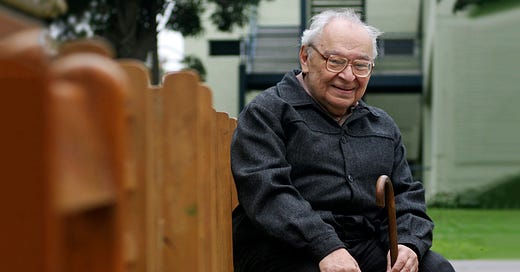As many readers likely know, the Peruvian theologian Gustavo Gutiérrez, O.P. passed away this past Tuesday evening in a Dominican residence in Lima. Gutiérrez was perhaps the most significant of the founders of Latin American liberation theology and had a profound impact on the Church and the world. His place is assured in any survey of the great theologians of the twentieth century, and the scale of his influence is marked by the fact that his death was covered by the Associated Press and in the New York Times, a rarity for theologians in our secular age.
Of course, Gutiérrez’s real legacy is his insistence on God’s love for the poor and his urgent call for the Church to be on the side of the poor. Writing in America, theologian Michael E. Lee offers a survey of Gutiérrez’s life and theological development that highlights this legacy.
One of the most interesting commemorations of Gutiérrez’s life and work has come from Cardinal Gerhard Müller, the former Prefect of the Dicastery for the Doctrine of Faith. Müller, who was appointed prefect by Pope Benedict XVI in 2012 and is perhaps best known for his criticisms of Pope Francis on a variety of issues, particularly after the former’s resignation at the end of his term as prefect in 2017. Nevertheless, Müller has long been sympathetic to the core insights of liberation theology. He and a group of other German and Austrian theologians had attended a seminar taught by Gutiérrez at the Instituto Bartolomé de Las Casas in Lima, which the latter had established in 1974. Müller and Gutiérrez became friends, with the latter attending the former’s episcopal consecration in Regensburg, Germany in 2002. The two co-authored the book On the Side of the Poor: The Theology of Liberation in 2013, with the English translation published in 2015. When the book was first published, Gutiérrez was welcomed to the Vatican by Pope Francis, a sign of both Gutiérrez’s lasting influence and of the changing fortunes of liberation theology in the Vatican. Speaking with OSV News, Müller expressed his faith that Gutiérrez is now among the communion of saints and affirmed the lasting legacy of Gutiérrez’s theological work.
I only met Gutiérrez once, at a conference at the University of Notre Dame, although I’ve visited the Instituto Bartolomé de Las Casas with undergraduate students on multiple occasions. Even though we did not have a personal friendship, as I described in this article from last year, he has nevertheless been a longtime intellectual and spiritual companion.
Gustavo Gutiérrez as an Intellectual and Spiritual Companion
Last week, I shared Leo Guardado’s excellent essay on the Peruvian theologian Gustavo Gutiérrez’s classic work A Theology of Liberation: History, Politics, and Salvation, commemorating the fiftieth anniversary of its publication in English. Theologian Michael Lee wrote a
On Thursday, the Vatican released a new encyclical of Pope Francis, Dilexit Nos, on the Sacred Heart of Jesus. In addition to recommending this traditional form of popular piety, the encyclical delves into theological anthropology, focusing on the heart as a person’s spiritual core. One of the most commented upon aspects of the encyclical is the fact that Francis returns to his critique of the “technocratic paradigm” first found in the 2015 encyclical Laudato Si’; in Dilexit Nos, he emphasizes the importance of the “heart” in “this age of artificial intelligence” (#20).
I haven’t had a chance to read the encyclical yet but will offer my thoughts as soon as I get a chance. I can’t help but note that last year Francis also authored an apostolic letter on the 17th-century French mathematician, scientist, and philosopher Blaise Pascal. There’s a certain irony that the Jesuit pope wrote in praise of the vehemently anti-Jesuit Pascal! The Jesuits, however, have a special devotion to the Sacred Heart of Jesus going back to the late 17th century, when the French nun Margaret Mary Alacoque received visions of Christ encouraging devotion to his Sacred Heart, a message she shared with Fr. Claude La Colombière, S.J., her religious community’s confessor. Devotion to the Sacred Heart became a polemical weapon against the Jansenists, emphasizing God’s loving mercy in contrast to the Jansenist view that Christ had died only for the elect. Perhaps Pope Francis’s intent is to signal the reconciliation of these competing currents in early modern Catholicism.
Back in June when Francis first announced he was working on a document on the theme of the Sacred Heart, I wrote an article on the great 20th-century Jesuit theologian Karl Rahner’s theology of the Sacred Heart. Like Pope Francis, Rahner focuses on the anthropological and spiritual significance of the heart (in fact, Francis cites Rahner in paragraph 15 of the encyclical). Rahner saw devotion to the Sacred Heart as an act of hope in the midst of the immense suffering of the modern world, a theme to which Francis likewise appeals.
Karl Rahner on the Sacred Heart of Jesus
This past Friday, a 2012 essay by Fr. James Martin, S.J. on devotion to the Sacred Heart of Jesus shot to the top of America’s list of the top five most popular articles on the magazine’s web site, a potential sign of latent interest in the devotion celebrated that day through a solemnity on the Church’s liturgical calendar. Martin traces the history of the devotion, which had its source in the visions of the 17th-century nun St. Margaret Mary Alacoque, later became especially associated with the Jesuit order, and, by the middle of the 20th century, had become immensely popular among Catholics around the world. In the second half of the 20th century, however, interest in the Sacred Heart of Jesus dropped off precipitously.
Stay tuned this weekend for more commentary on the Synod on Synodality, which is in its final days! And thank you for reading Window Light.







